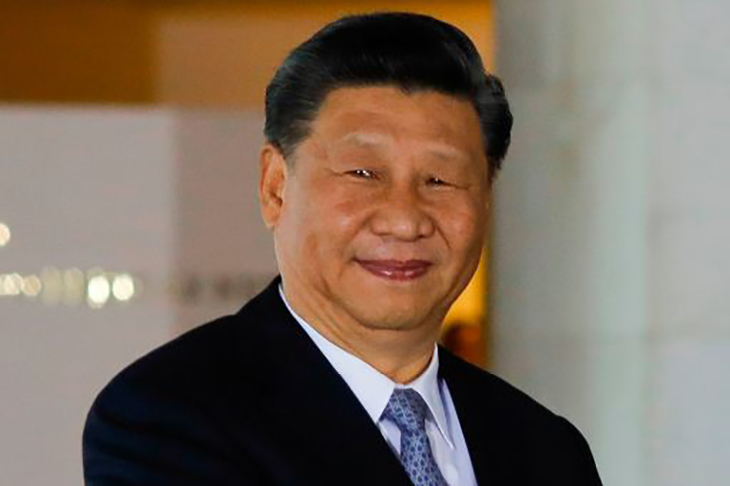From last fall, in an extension of a personality cult not seen since Mao Zedong, “Xi Jinping Thought” is being incorporated into China’s national curriculum. School textbooks are emblazoned with Xi’s smiling face, together with heartwarming slogans telling readers as young as six that their leader is watching over them. “Grandpa Xi Jinping is very busy with work, but no matter how busy he is, he still joins in our activities and cares about our growth,” reads one.
“Xi Jinping Thought” must be taught at all levels of education, from elementary school to graduate programs, and there is special emphasis on capturing the minds of the youngest children. Elementary schools “will focus on cultivating love for the country, the Communist Party of China and socialism,” according to Global Times, a CCP tabloid. A circular issued by the National Textbook Committee Office of the education ministry says that elementary school children must be made aware that “Chairman Xi guides the whole party and the Chinese people.”
Textbooks are tailored for each age group. Six- to eight-year-olds are told of the need to “button the first button of life correctly,” an injunction often used by Xi to stress the need for conformity and obedience from an early age. The messages to older children get a little more complex — but only a little. They stress the need for “absolute party leadership,” with Xi at the helm.
The books often employ folksy homilies to make their point. One explains how Xi’s love for China began with a lecture his mother gave him at an early age about a patriotic Song Dynasty general. Another explains how Xi, who has no military experience, has a “deep feeling for the army” because he wore military uniforms when he was a child. There is plenty of nationalist chest-thumping, as students learn how Xi defeated Covid-19, lifted China out of poverty and set the country on a path towards becoming a “modern socialist great power.” Graduate students are expected to be able to “publicize, interpret and study” Xi’s thoughts, according to the education ministry circular.
In many ways the education ministry is to be congratulated for attempting the near impossible — making some sense of the vagaries of “Xi Jinping Thought on Socialism with Chinese Characteristics for a New Era,” to give the full title of the political doctrine first announced at the party’s 2017 National Congress. Elementary schools are merely the latest extension of “Xi Jinping Thought.” It has already been written into the constitution, and it is the subject of university courses and of compulsory study by Party members. Party propagandists even summoned more than 100 of the nation’s top actors, filmmakers and pop stars to a special cultural forum in order to study Xi’s “Thought” as a way of raising “cultural-ethical standards.”
Yet it has always been very difficult to get a straight answer to the question: “What is Xi Jinping Thought?” Even hardened party hacks smile awkwardly and shuffle their feet with embarrassment before changing the subject.
Xi’s “Thought” can perhaps best be described as a hodgepodge of self-serving ideas. He peppers many of his speeches with quotes from Mao and Marx, but also picks selectively from Confucius, a man Mao loathed. Confucianism was the backbone of the imperial system, but Xi likes the bits about obedience to authority. He has also quoted philosopher Han Feizi, often described as “China’s Machiavelli” and a favorite of Mao), who used him to justify the Cultural Revolution. Xi uses Han’s words to justify his “anti-corruption” clampdown: “When those who uphold the law are strong, the state is strong. When they are weak, the state is weak.”
Xi’s “Thought” lacks any real coherence, yet it is possible to identify three underlying themes. One is nationalism, bordering at times on xenophobia, and an associated culture of grievance.
The introduction of Xi’s “Thought” into elementary schools follows a campaign to eliminate “foreign ideas” from education, which has become a particular obsession of his. A party document ordered educators to “firmly resist infiltration by foreign forces”; China’s education minister declared that China should “never let textbooks promoting western values enter into our classes… Any views that attack and defame the leadership of the party or smear socialism must never be allowed.” One overenthusiastic local government in Gansu province took the instruction to heart and posted images of two women burning a pile of “illegal” and “improper” books outside the county library. They claimed to be following a directive to “firmly cleanse” libraries to create a “healthy and safe environment for education.”
The images of the bonfire spread on social media, alongside comparisons with the Qin Dynasty practice of burning books (along with the scholars who wrote them), according somewhat ironically with the second theme of Xi’s “thought,” which positions the CCP as the natural inheritor and embodiment of Chinese tradition and history.
The third and most important theme is Xi himself. The ideology, if indeed it can be called that, is designed to justify his accumulation of personal power. The CCP has sought to depict Xi as a literary genius. In 2015, during his first visit to the United States as leader, he claimed to have read the works of Thomas Paine, Henry David Thoreau, Walt Whitman, Mark Twain and Ernest Hemingway. That was nothing compared with his grasp of Russian literature: Pushkin, Gogol, Dostoyevsky, Turgenev and Chekhov were among writers on a list he gave when visiting Sochi for the Winter Olympics in 2014. Trips to France, Germany and the UK have resulted in similar bibliophilic claims. During a speech to the British parliament as part of a 2015 state visit, he quoted The Tempest, telling lawmakers: “What’s past is prologue.”
But if Xi is widely read, it doesn’t show in his own literary efforts. The Governance of China, the bedrock of “Xi Jinping Thought,” first published in 2014, stretches to three volumes of turgid speeches and writings. “Like spring drizzle falling without a sound, we should disseminate core socialist values in a gentle and lively way” is one of the better lines in the 515 jargon-ridden pages of Volume 1. “Achieving the rejuvenation of the Chinese nation has been the greatest dream of the Chinese people since the advent of modern times” is another. The latest extension of Xi’s “Thought” has not gone unchallenged on social media in China. “Brainwashing starts from childhood,” said one user of Weibo. Another asked: “Can we refuse?” For older Chinese, a campaign focused on the adoration of the leader stirs painful memories of Mao’s Cultural Revolution. At least it could be argued that Mao had a personality to make a cult out of, warped and dangerous though it was. Dour, humorless Xi is a harder sell.
The party also has a “Study the Great Nation” app, dubbed “Xi’s Little Red App.” It contains images and articles about “Xi Jinping Thought” and his activities. Users can take part in competitions and quizzes, testing their knowledge to win points and prizes. After its launch two years ago, the authorities claimed it was the most downloaded app in China and had 100 million users — though not necessarily by choice. Not only was it heavily promoted by schools, universities and the state media, its use is mandatory among civil servants and party officials. In order to obtain a press card and do their jobs, Chinese journalists have to pass a test on the life of Xi, delivered via the app.
And the app had an extra feature: it spied on users. While users studied “Xi Jinping Thought,” the app studied them right back. The Open Technology Fund, an organization promoting internet freedom, found that the Android version, widely used on smartphones in China, had a backdoor which gave access to messages, photos, contacts and browsing history. It could also scan other apps on the phone and activate microphones. It embodies the party’s stultifying propaganda, but also its deep-seated paranoia, both of which define Xi’s rule as he now seeks to capture the minds of even the youngest schoolchildren with one overriding message: it is their duty to obey.


















